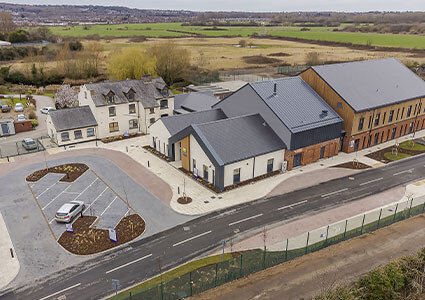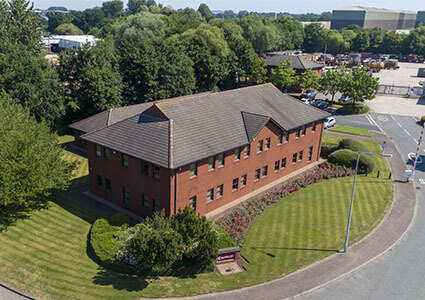
Paul Inions and his team demonstrate a textbook management buyout with McPhillips
The McPhillips family initially established McPhillips in 1964, as a groundworks contractor to housebuilders and local authorities around its base in Shropshire, UK. Paul Inions, Managing Director, first joined the business in the early 1990s, and has spent a great deal of his career growing alongside the organisation.
“When I came to McPhillips, we were around £5 million in annual turnover and I recall we rattled around our new purpose-built office,” he opens. “It’s been a joy over the last few decades to be a part of the tremendous growth that the business has experienced, which has seen us expand from just roads, sewers, and general civils operations into the multidisciplinary contractor that we are today.
“The company operates as both a main building and civil engineering contractor and offers solutions to local authorities, private clients and developers, and housebuilders. The McPhillips family exited the organisation six years ago, at which point I, together with three colleagues, conducted a management buyout. We’ve each served the brand for over 20 years and have all grown up with it. In doing so, we have witnessed its transformation into a broadly skilled construction business, first-hand. We directly employ over 200 people and own and operate our own fleet of plant and machinery, to serve a client base that typically sits within a 100-mile radius of our Shropshire premises.”
Robust relationships
Given McPhillips’ family-owned heritage, the people side of the organisation has always been high on the company’s agenda. This is something that Paul and his team have been meticulous about maintaining, since taking over the reins in 2017.
“It’s a bit of a cliché,” he continues, “but McPhillips has always carried strong principles with regards to its employees. It’s something that’s clearly demonstrated through the tenure of our workforce. We’ve got plenty of team members who have been here longer than I have, even some who’ve surpassed the 40-year mark. The founders’ family touch remains to this day, and it’s something that we uphold with the greatest importance.
“If people want to progress, we always try to facilitate growth and training within their positions, and we take on between six and ten apprentices every year through our programme. We’re hugely passionate about being able to offer younger starters the opportunity to enter the ground working environment and to flourish professionally under our direction. We have multiple contract managers and site managers who originally started out on the scheme, who have developed through learning and feeling appreciated by McPhillips. I’m incredibly proud that we’ve managed to maintain this key part of our ethos, despite now sitting closer to £70 million turnover per annum.”
Regardless of the success that the organisation maintains internally, like many other enterprises across the UK, McPhillips has been bombarded with external issues caused by the current inflationary climate across the globe.
“What we do is relentless,” Paul states, “and, although the wheels never stop churning and we’re always busy outside, we are always wary when it comes to securing our future work streams. Traditionally, McPhillips has always been incredibly capable of adapting to the shifts within the economy. For example, we were previously heavily invested in the housebuilding market, but when the recession across 2007 and 2008 started to hit us, we were fortunate enough that we had other strings to our bow.
“We were already working in the water industry and that together with strong relationships with our existing clients helped us through a challenging period. Since then, we have continued to develop our overall offerings to include a number of different strands. As Managing Director, it’s one of my leading responsibilities; to future proof our client base and secure a continued and diverse workstream for our employees.
“Similarly,” he adds, “Our building capabilities have also grown considerably over recent years with commercial industrial buildings, animal welfare developments, leisure and public sector facilities now in our portfolio. Another of our longstanding relationships is with Hales Sawmills, based in Market Drayton. They first approached us just over ten years ago, when they were looking to expand their offering in the sawmill market. Following our first successful development for them in 2012, we then worked with them in 2016, and have recently completed a further £2.5 million retail expansion in Shrewsbury.
“That’s the typical sort of relationship that we look to adopt with clients. Elsewhere, we’ve been working with the likes of the Dogs Trust and Shropshire Council for many years, and we have solid relationships with numerous other clients throughout the Midlands and Northwest.”
 Strategic management
Strategic management
As the conversation begins to draw to a close, Paul reflects further on the last few years. “The last 18 months have been horrendous for everyone in the construction industry,” he explains. “Everybody has experienced it in their personal lives too, but the escalating cost pressures are tenfold for the businesses in our sector. As I say, versatility has always been one of our strong points, so we’ve been consolidating our efforts in response to the latest changes. We still aspire to grow, but only organically, and we’re very prudent in the strategic management of what we do and where we go.
“McPhillips is, and always has been, extremely agile, which goes back to the broadness and flexibility of our offerings. We can flip between different sectors in line with the economy as it ebbs and flows. But, looking ahead, we are positive, our order book is healthy, which is fantastic, and, to a certain extent, is mapping out what we expect to be the business’ ongoing outlook. Over the next 18 or so months, we’re going to be focusing on pure consolidation, so that we’re in a good place when the economy springs back to life. It’s nothing new to us, we’ve battled these cycles of recession before. It’s just a case of having the strength to weather the storm.
“Even further than that,” he concludes, “over the next five years we want to continue to develop and strengthen the depth of our operations We have some really exciting schemes ongoing at present and rather than look backwards, we focus ahead on what is in front of us. Really when you look at it, it’s just to continue working hard at what we do.”
www.mcphillips.co.uk